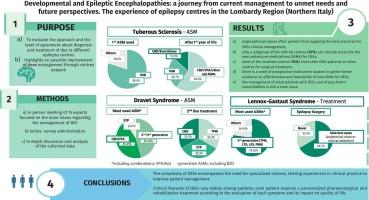发展性和癫痫性脑病:从目前的护理到未来的观点——来自意大利伦巴第癫痫中心的见解。
IF 2.3
3区 医学
Q2 BEHAVIORAL SCIENCES
引用次数: 0
摘要
目的:发育性和癫痫性脑病是复杂的疾病,需要神经学家的专业知识和专门的诊断和治疗设施。在专业中心之间建立网络可以提高对本科学位患者的整体护理质量。本研究旨在评估意大利北部伦巴第不同癫痫中心对迪斯的治疗方法。方法:来自伦巴第癫痫中心的专家小组于2023年会面,目的是分享他们对迪斯的管理经验,特别是Lennox-Gastaut综合征,Dravet综合征和结节性硬化症。这一合作倡议不仅旨在比较目前的做法,而且还旨在探索在专业中心之间建立更强大的网络的潜力,以改善获得学位的患者的护理途径。会议结束后,向与会者分发了一份调查问卷,以收集有关诊断和治疗方法的定量数据,并确定与dee患者有关的未满足需求。结果:专家组确定了高等专科医院管理中的几个关键问题:a)组织障碍经常阻碍高等专科医院临床管理最佳实践的实施;B)由于立法限制,为罕见病开特定新药的能力只授予一小部分转诊中心(67%);c)大多数涉及的中心(70%)必须将学位课程患者转介到其他设施进行癫痫手术;d)对成年dei患者的管理,特别是那些有精神合并症的患者,仍然是一个重大挑战。结论:建立不同转诊中心之间的网络可以改善和加强DEE患者的管理。本文章由计算机程序翻译,如有差异,请以英文原文为准。

Developmental and epileptic encephalopathies: From current care to future perspectives − insights from epilepsy centres in Lombardy, Italy
Purpose
Developmental and epileptic encephalopathies (DEEs) are complex diseases, requiring specialized expertise from neurologists and dedicated facilities for diagnosis and treatment. Building networks among specialized centres can improve the overall quality of care for patients with DEEs. This study aimed to evaluate the approach to DEEs in different epilepsy centres in Lombardy, Northern Italy.
Methods
A panel of experts from Lombardy’s epilepsy centres met in 2023 with the aim of sharing their experiences about DEEs management, specifically Lennox-Gastaut syndrome, Dravet syndrome and Tuberous Sclerosis Complex. This collaborative initiative aimed not only to compare current practices, but also to explore the potential for building stronger networks among specialized centres to improve care pathways for patients with DEEs. Following the meeting, a survey was distributed to the participants to gather quantitative data on diagnostic and treatment approaches, as well as to identify the unmet needs concerning patients with DEEs.
Results
The expert panel identified several key issues in the management of DEEs: a) organizational barriers often hinder the implementation of best practices in the clinical management of DEEs; b) due to legislative limitations, the ability to prescribe specific new medications for rare diseases is granted excusively to a subset of referral centres (67%); c) the majority of the involved centres (70%) must refer DEEs patients to other facilities for epilepsy surgery; d) the management of adult patients with DEEs, especially those with psychiatric comorbidities, remains a major challenge.
Conclusions
Establishing networks between different referral centres can improve and enhance DEE patients’ management.
求助全文
通过发布文献求助,成功后即可免费获取论文全文。
去求助
来源期刊

Epilepsy & Behavior
医学-行为科学
CiteScore
5.40
自引率
15.40%
发文量
385
审稿时长
43 days
期刊介绍:
Epilepsy & Behavior is the fastest-growing international journal uniquely devoted to the rapid dissemination of the most current information available on the behavioral aspects of seizures and epilepsy.
Epilepsy & Behavior presents original peer-reviewed articles based on laboratory and clinical research. Topics are drawn from a variety of fields, including clinical neurology, neurosurgery, neuropsychiatry, neuropsychology, neurophysiology, neuropharmacology, and neuroimaging.
From September 2012 Epilepsy & Behavior stopped accepting Case Reports for publication in the journal. From this date authors who submit to Epilepsy & Behavior will be offered a transfer or asked to resubmit their Case Reports to its new sister journal, Epilepsy & Behavior Case Reports.
 求助内容:
求助内容: 应助结果提醒方式:
应助结果提醒方式:


